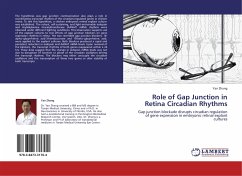
Circadian regulation of the central leptin function
Perfect timing matters
Versandkostenfrei!
Versandfertig in 6-10 Tagen
27,99 €
inkl. MwSt.

PAYBACK Punkte
14 °P sammeln!
Lifestyle has a great impact on the circadian timing system which regulates behavior and metabolism along the 24-h day. Dysregulation of circadian rhythms is correlated with the development of metabolic disorders such as obesity. In Western societies, overweight and obesity have strongly increased during the last decades. An important player in the regulation of food intake and energy homeostasis is the hormone leptin which acts in the hypothalamus via binding to the long isoform of its receptor, ObRb, to reduce food intake. This book provides an overview of the transcriptional gene regulation...
Lifestyle has a great impact on the circadian timing system which regulates behavior and metabolism along the 24-h day. Dysregulation of circadian rhythms is correlated with the development of metabolic disorders such as obesity. In Western societies, overweight and obesity have strongly increased during the last decades. An important player in the regulation of food intake and energy homeostasis is the hormone leptin which acts in the hypothalamus via binding to the long isoform of its receptor, ObRb, to reduce food intake. This book provides an overview of the transcriptional gene regulation of ObRb in certain brain regions. Furthermore, the importance of the circadian clock in ObRb-expressing neurons to mediate circadian rhythms of leptin signaling is highlighted. Analyzing how circadian regulation of the leptin receptor influences feeding behavior and energy homeostasis might be especially helpful for students or researchers working in the field of molecular or neurobiology to understand deregulations in metabolism particularly with regard to the development of obesity.












